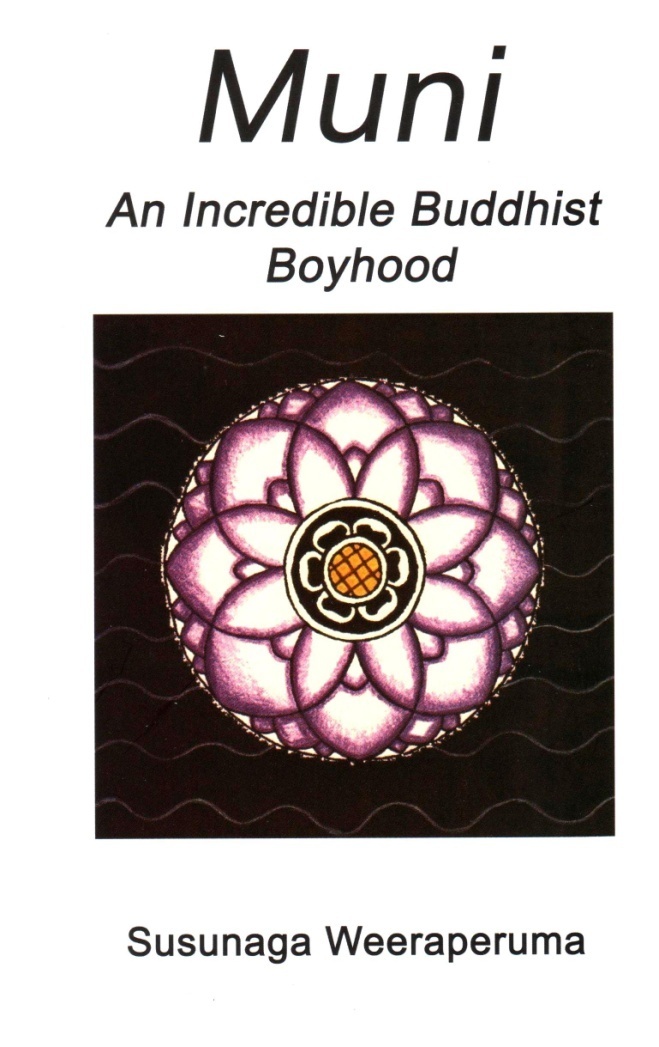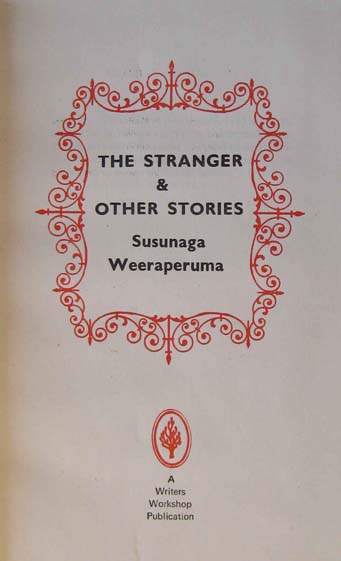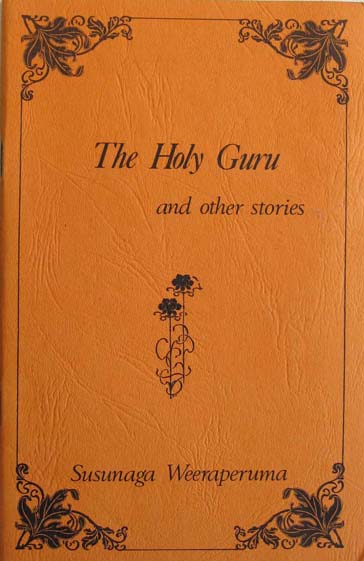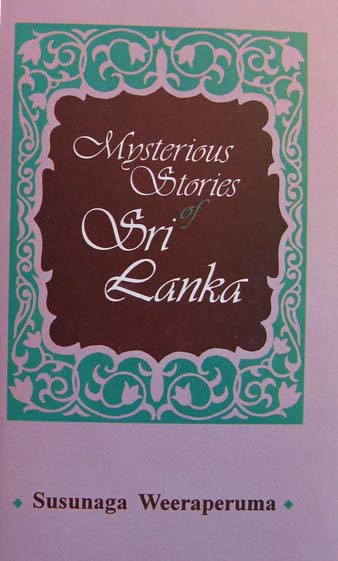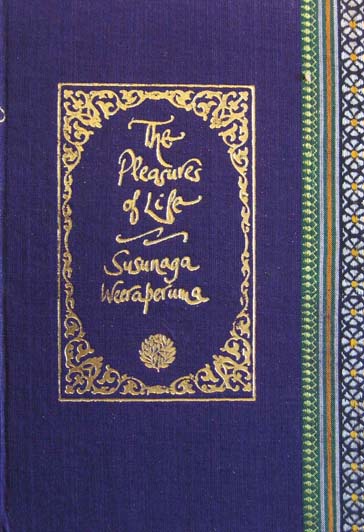 |
Creative Writing
|
 |
| Saida of Marrakesh : a Novella | (New book) | Bilingual text English — Arabic |
| Sunil the Struggling Student : a Novel | (New book) |
Muni An Incredible Buddhist Boyhood: a Novel
The Stranger and Other Stories
The Holy Guru and Other Stories
Mysterious Stories of Sri Lanka
The Homeless Life and Other Stories
The Pleasures of Life: a One-Act Play
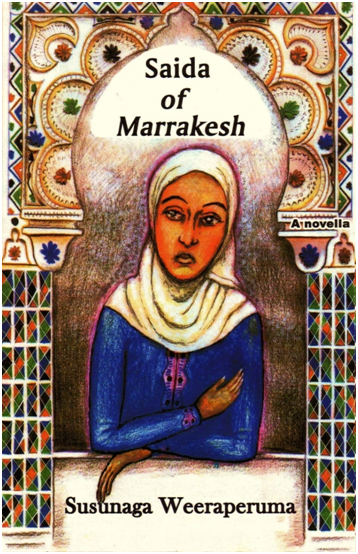 |
Marrakech :
M. Al Aafaq |
|
Translated from English into Arabic by Ghina Chokchok
Soon after Susunaga and
Claudia temporarily leave their home in France and fly to the touristy
town of Marrakesh for the purpose of spending a quiet holiday, they
meet a charming young Moroccan woman by the name of Saida. Three years
ago all the members of her family had died when a drunken driver
crashed into her father’s car. A woman of means, Saida volunteers to
take the two visitors in her car and show them the sights of Marrakesh
free of charge. The friendship between the three of them deepens. |
|
click on the flowers to go up to the menu |
 |
Marrakech : M.
Al Aafaq
|
|
This thought-provoking novel tells the story of Sunil, a Sri Lankan adolescent. It traces his development from a poverty-stricken boy to the successful founder of a world-wide anti-war campaign to save humanity from the path of death and destruction.The novel is written from the standpoint of an older Sunil who reviews his years as a schoolboy and student. Being by nature a keen observer of society, Sunil experiences quite early in life the barriers that separate man from his fellow men --- skin colour, money, education and occupation. Sunil is socially disadvantaged because he is dark-complexioned and comes from a poor family. His mother works as a cleaner. Soon this bold and spirited boy sees the meaninglessness of these barriers, which do not result in good behaviour and personal fulfilment. Although his mother is poor and illiterate, Sunil perceives that she has a nobler mind than many a wealthy and educated person. Sunil's mother is one of the most amiable characters of this novel, being selfless, charmingly naïve and content with her lot. When Sunil turns fourteen, his parents disclose to him that he had been a foundling. The revelation of Sunil's adoption, however, does not affect the emotional bond between him and the couple who raised him. Their relationship is based on mutual affection. The most crucial event in Sunil's life is the tragic death of his parents in a terrorist attack. Sunil is suddenly homeless and destitute. His life changes dramatically when Kelaart, a wealthy and eccentric Burgher gentleman, takes pity on the boy on the streets and invites him to his posh residence next to the University of Peradeniya in Kandy. Kelaart, who is considerably older than Sunil, turns out to be a gay. He becomes Sunil's protector and friend. They are both interested in books and they share their grief of having lost loved ones in the bomb explosion. For Kelaart's sweetheart, a boy called Percy, had also died when the bomb exploded. While Sunil is studying for a bachelor's degree, Kelaart spends his time writing a book to be called The Trials and Tribulations of Being Gay. Sunil has no interest whatsoever in homosexuality. Although their friendship is based on affection, their outlook on life is quite different. Whereas Sunil, a vegetarian, leads a simple, chaste and austere way of life, Kelaart is mainly interested in sensual pleasures, beautiful clothes and playing practical jokes. Despite these differences, Kelaart very generously finances Sunil's correspondence courses, gives him material security and even bequeaths his fortune to this parentless boy. Sunil comes to know about a group of rebellious students who are fighting against their poverty by staging violent protests. They are particularly keen on persuading the state to grant financial allowances to all unemployed graduates. Their riots cause the deaths of several innocent people. Sunil is once again confronted with the world of human ruthlessness and violence, especially when a large group of students follow him when he is returning home after seeing the street demonstrations. The students ask Sunil to allow them to live in Kelaart's house for a period of one week. Sunil turns down their demand. Sunil is beaten by the student leader. Ironically, Sunil has to defend the property of his rich benefactor against the aggression of the very social group to which he truly belongs --- the poverty-stricken destitute students. Although Sunil fails to prevent the students from entering Kelaart's house, the shrewd boy secretly phones the police and makes a complaint. Thereupon the police raid Kelaart's house and arrest the student squatters, thereby preventing the continuation of the countrywide disturbances. Sunil's heroic defence of Kelaart's residence increases Kelaart's fondness for the boy. Sunil's episode with the violent students troubles him deeply. Like them this reflective teenager feels inwardly insecure. He never takes Kelaart's generosity for granted and fears that he could become homeless once again. But what distinguishes him from these students is his conviction that violence, both expressed and unexpressed, is never a solution. Hatred in all forms is abhorrent to Sunil. The relationship between Kelaart and Sunil undergoes a crisis when Kelaart starts making overtures to him. Kelaart even proposes to Sunil. The protégé, who is not gay, declines to marry his benefactor. Kelaart, besides feeling rejected by Sunil, is hurt even more when Sunil cultivates the friendship of a fellow female student called Menika. Kelaart, who has a low opinion of women in general, refuses to meet Sunil's new friend. The tensions between Sunil and Kelaart increase. Then, without so much as saying good-bye, Sunil leaves Kelaart's house. When Sunil visits Menika, she gives him the address of her aunt Vimala in Colombo. Menika telephones her aunt and confirms that Sunil is agreeable to accepting the aunt's offer of board and lodging. In Colombo, while looking for a taxi to visit Vimala's house, Sunil is abducted by a stranger who forcibly takes him to a clinic. He comes to know from the cook that this clinic sells the body parts of poor youngsters to wealthy patients all over the world who are in need of organs. Luckily, however, Sunil manages to escape from the so-called clinic unharmed. He complains to the police about the illegal transplant racket. Sunil lives happily with Menika's philanthropic aunt who is a fighter for environmental causes. He studies very hard. Eventually he obtains his bachelor's degree. However, Sunil is not interested in getting a job, thanks to Kelaart who regularly sends him money despite their estrangement. Besides, Sunil dislikes being enslaved by a boss. Overjoyed, Kelaart telephones Sunil and congratulates him on having passed his university finals. Kelaart, who is now given to meditation, has lost all interest in sex. Kelaart refers to his inner transformation. There is a reconciliation between Kelaart and Sunil, resulting in a brotherly bond between the two. Sunil, who had been a witness to violence and bloodshed during his life, starts a pacifist movement. His erstwhile friend Kelaart, the environmentalist Vimala and the scholar Menika decide to join him and actively take part in his campaign for peace. At the Colombo Town Hall there is an inaugural meeting of AWAKE (Abolish War And Killing Enemies). The various arguments for and against war are discussed. Sunil eloquently makes a strong case for immediate disarmament, explaining that the military can become farmers. Great savings will follow and prices will fall, living standards will rise, more money will go for the preservation of the environment and more resources will be available for cultural purposes. Sunil and his friends give talks, urging people to give up waging war and stop producing lethal weapons. They visit many countries where they are warmly received. Sunil becomes a world-renowned personality. The logo of AWAKE is the dove. The gentle white dove, so to speak, gracefully flaps its wings and flies clear of the dark clouds. As it moves from continent to continent, the beautiful bird warns against war and sings the song of perpetual peace. |
|
click on the flowers to go up to the menu |
 |
click on the flowers to
go up to the menu
|
|
|
|
|
Matterhorn
As the mountain train slowly approached the Alpine town of Zermatt, passing forests of dark green conifers and gushing waterfalls, the passengers in my compartment rushed to the window to experience their first glimpse of the glorious mountain that draws tens of thousands of tourists from afar every year. The passengers were a medley of mountaineers, nature lovers, globetrotters and holidayers. We had all come to savour the beauty of the great mountain. After alighting at Zermatt, a quiet picturesque town that owes its prosperity to the many tourists who go there to marvel at the noble mountain, I decided to walk towards the mountain itself as quickly as possible. I had to jump over sparkling mountain streams that are bordered with luxuriant vegetation. Having to trample down so many delicate Alpine wild flowers along the narrow soggy footpaths seemed like an act of vandalism. Those lovely plants and fragrant flowers, just like human beings, are also struggling to survive and therefore it pains one to injure them and ignore their right to an enjoyable existence. After several hours of climbing mountains my legs were pretty tired and my poor shoulders were aching under the weight of an overloaded rucksack. So I decided to take a rest by stretching myself on an enormous greyish boulder stone near the hamlet of Furi. There before my very eyes was Matterhorn, 4478 metres high and one of the tallest mountains in Europe, gigantic, snow-clad, a white pyramidlike structure, a masterpiece sculpted by Mother Nature herself in bygone ages. Its immaculate white snow glistened in the evening sun and one felt that nothing on earth could be whiter or purer than this spectacle. The serene white mountain even seemed part of the drifting white clouds in the vast blue sky. Its conical summit, turned heavenwards, like the spire of an ancient cathedral, seemed to stress spiritual values and show scorn at mundane affairs. I was then struck by nostalgic thoughts relating to certain outstanding mountains in India and Sri Lanka. These mountains, probably because of their great height and beauty, are regarded with religious awe in these countries. For thousands of years pious pilgrims have worshipped at these places which are considered the sacred abodes of deities. For instance, Kailas in the Himalayas is believed to be the paradise of the gods, particularly of Siva and Kubera. Therefore it is reasonable to think that the gods must surely have also noticed the existence of majestic Matterhorn. Its sublime character could not have remained unnoticed by the gods. Unknown to man, maybe there is a god who invisibly lives here, somewhere in the vicinity of the mountain. There was thunder and lightning. It started raining that chilly evening and I was soon soaked to the skin. I was shivering and quite hungry. I was physically weak and unfit to walk all the way to Zermatt in time to catch the last train back to my home in Bern. Very soon it was going to be nightfall. So I took refuge from the storm by standing under a tree. It occurred to me that I should spend the night in a mountain cave, if I could find one, or perhaps go to a farmstead but unfortunately I could see no sign of human habitation anywhere around me. Three hours of anxious waiting had passed and now it was quite dark. I resigned myself to sleeping under that tree in the cold. I was surprised to see a small thin man standing right in front of me. He had a long white beard and deep blue eyes. He was barefooted but the rest of his body was covered in woollen clothing. He spoke softly: “My son, get under this umbrella and let us walk together to my hut.” I gladly accepted the invitation to visit his modest dwelling. He lived in a small wooden cabin --- the walls, floor and ceiling were made of old wooden planks. There was just one iron stove that was used for both cooking and heating. He sat on the floor and offered me the only chair he had. Then he helped to rinse my wet clothes and dry them by the fire. I had known him only for about one hour and during this short period we had hardly conversed. Actually there was no need to have a conversation because his kind deeds were speaking so eloquently. He was warm-hearted and generous. He offered me apricots, apples and a glass of warm milk. “Sir, are you also a vegetarian?” I asked. “Of course,” he answered and added: “I don't eat animals because they are my brothers and sisters.” “Sir, do you live alone here?” “Not really --- a person who communes with nature is never alone. I am related to the stars, skies, wind, earth and all the trees and shrubs and animals and insects.” Finding his mystical statements too difficult to understand, I wished to change the course of our conversation to worldly subjects. “Sir, what is your recipe for good health?” “Pure air and pure water.” I explained that these things were not always available in large cities. He was lucky to live on the mountains. I remarked that vast numbers of people in the world were dying of cancer. Cancer is destroying the world. He quickly corrected me by saying: “Hate is the cancer. Love is the answer.” It was nearing midnight and the gentleman provided me with a haystack to sleep in. I slept soundly. The following morning, after breakfast, I thanked my host very much for his hospitality and kindness. As I was taking leave of him, I asked one last question: “Sir, may I know your good name, please?” He replied: “I have no name! I am the nameless one. That which is universal cannot be named. I have no name because nothing binds me. Like the fresh mountain wind, I am free. I blow everywhere.” Many years later I remembered this stranger from the mountains who opened his heart to a person in distress. I will always associate him with the splendour of Matterhorn and recall the way he helped me without expecting anything from me in return. I will also treasure his words of wisdom. Could he not have been the nameless deity of Matterhorn? |
click on the flowers to go up to the menu
|
|
The Holy Guru
“Now relax completely and speak freely,” instructed Dr Mortimer, a veteran psychoanalyst, as his patient, Ray Samuel, 28, stretched out his tired, tense and nervous body on the soft couch.
“Doctor, I feel so depressed. The zeal of youth seems to have vanished. There's nothing to live for. I constantly worry about not having achieved anything worthwhile in life. After much hard work I got my degree in veterinary science. But, alas, I've repeatedly failed in my efforts to realise my life's ambition of acquiring a huge farm with lots and lots of animals --- cattle, poultry, sheep, swine and all that, you know.”
“Why do you say you have failed?”
“Because nobody is willing to advance me the necessary capital to purchase a large piece of land for this purpose. No blooming bank is willing to lend. It'll take decades before I can save sufficient money. Oh! the obstacles are so great. Yet I long to be free and independent and be my own boss on my own farm. You see, I have all the academic and practical training to manage a farm. What's the point of living if you can't realise your life's ambition?”
“Young man,” remarked Dr Mortimer with an affable smile, “why not regard failure as a mere detour on the road to success?”
“And this sense of failure,” complained Samuel with a look of misery on his face, “is like a nightmare that is troubling me night and day with the result that I haven't been sleeping well lately. So please tell me doctor, what I must do?”
“I'm not changing the subject but are you married?”
“I wish I were! Who would want to marry a penniless fellow like me and a dreamer at that? The trouble with me is that I'm married to my ambition.”
“Now there's nothing intrinsically wrong in having an ambition,” observed Dr Mortimer philosophically, “so long as you pursue your aim patiently and never lose heart. But if you feel that the obstacles in your way are far too great and even insurmountable then give up your ambition. In doing so you'll experience a great serenity of mind. Try giving it up!”
Samuel returned to his Bloomsbury apartment feeling greatly unburdened in mind. The idea of abandoning a long-cherished ambition seemed an effective enough means of bringing a certain instant relief and much needed comfort to his distraught mind. He pondered: “I'll be the poorer without a farm but then I'll be richer in spirit. The rich are unhappy because they are discontented and are eternally craving for more. But I will be happy even if all I have is an empty purse! I won't foolishly hanker after material things. Happiness and peace of mind are the only things that matter in life.” His eyes gleamed with a joy that he had not experienced for many a month.
Filled with the inspiration of one who has just experienced a sudden “spiritual rebirth”, Samuel walked the streets with his head held high and there was a joyous dignity in his bearing.
“You're looking very cheerful and well today, Sir,” observed the milkman who was on his rounds.
“I should be,” replied Samuel confidently, “because I'm going to give up all worldly ambition and become a holy man or a yogi.”
“A yoke, Sir?” asked the milkman jokingly.
“Oh, no! A yogi is one who renounces the world to lead a spiritual life.”
It was indeed ironical that no sooner had Samuel vowed to tread the path of renunciation than he received a letter from Latin American Travel Agents Limited, urging him to enroll himself for a long ocean cruise, along with a few hundred property speculators, with the final objective of acquiring a suitable piece of land somewhere in South America for farming, grazing or other enterprise:
Dear Mr Samuel,
I refer to your kind inquiry about our forthcoming Latin American cruise which is planned to commence in 3 months' time.
Every year we organise a cruise in our luxury ocean liner ODILIANA for 300 passengers who wish to make a leisurely tour of the various Latin American states for reasons of either business or pleasure. The duration of the tour will be approximately 8 months. Therefore, with our unhurried pace, our passengers can stay for long periods in different countries. This will enable them to undertake local tours or participate in various recreational activities (hockey, golf, water-skiing, etc.) or negotiate with real estate agents for the purchase of large tracts of land. If my past experience of organising these cruises is anything to go by, then I am certain that this year too the vast majority of our passengers will be prospective land buyers. I understand that in the vast and hitherto unexplored regions of countries such as Brazil and Argentina, as indeed in the whole continent of South America, it is still possible to purchase sizeable areas of land at very cheap or reasonable prices.
Since the number of passengers we can take is restricted to 300, you are requested to enroll yourself soon to avoid disappointment.
In the concluding paragraph of your letter you have touched on the question of whether you could enroll yourself for next year's cruise if, owing to lack of funds, you should be prevented from travelling this year.
Owing to the uncertainty in your plans I will write you again, probably during the week preceding our departure to Rio de Janeiro, and will offer you a cabin if one is available at that time.
Yours sincerely,
Trevor Casson
General Manager
After reading it carefully for the second time Samuel exclaimed:
“This letter is the work of the Devil! I will not be tempted!”
Disdainfully he tore the letter to pieces and threw it into the waste-paper basket.
Samuel gave himself the exotic name of Swami Sathya because he had read in a book of Hindu scriptures that “sathya” means truth. He had his head fully shaved and started growing a beard; he put on saffron coloured clothes, consisting of a loose pair of trousers, which seemed rather like cotton pyjamas, and a long overcoat. Around his neck he wore a string of dark beads which he occasionally used as a rosary. As his beard grew longer Swami Sathya, with his slight figure, bony ascetic face and piercing eyes began to look more and more like a genuine yogi from the Himalayas.
At the entrance to his apartment he placed a colourfully painted notice:
|
The lounge of his apartment was converted into a small hall that could accommodate about sixty persons; its bare walls were decorated with traditional Indian paintings that depicted various deities and especially Lord Krishna playing the flute in a rural setting and surrounded by lovely gopis or milkmaids; the mantelpiece was adorned with a bronze statue of Lord Shiva performing his famous cosmic dance. The Hindu décor of the hall and the religious atmosphere it evoked was particularly pleasing to Swami Sathya who remarked to himself: “This is going to be the venue of my spiritual mission.”
|
No sooner had the swami launched his new career than several favourable newspaper and TV reports of his activities gave him the national and international publicity that he eagerly sought. For example, a feature on him in a leading London Sunday newspaper observed: “London's newest guru continues to attract large crowds. Tourists, students, hippies, housewives, business executives and wealthy devotees sit at his sacred feet and treasure all the words of wisdom that flow from his lips. In accordance with oriental religious tradition the swami does not handle money. The numerous bequests and gifts that are offered him are being channelled into the Divine Life Fund of which the swami is the sole custodian. The various activities of the Sathya Centre for Meditation, Spiritual Surrender and Divine Bliss are financed from this considerable fund. In the course of my interview with him the swami emphasised that his centre is strictly non-profit making and that he is opposed to the 'irresponsible commercialisation of religion which is a most deplorable trend in the modern world.' Apart from his illuminating discourses the swami also offers a counselling service for those who are depressed in spirits.” One Sunday morning the sweet perfumes of roses, carnations and burning incense mingled with each other and permeated the atmosphere of the hall where a group of some 50 American devotees were waiting. They were seated cross-legged on the carpet in the lotus posture for the morning's discourse to begin. These pious pilgrims had travelled all the way from New York, Chicago and Los Angeles in a special charter flight to “have darshan” or to see their spiritual master in person. Some of the gorgeous roses and rare orchids that lay on the swami's dais were the offerings of one of the devotees, an American millionaire who had made his fortune by selling armaments to the American government during the Vietnam war. After solemnly observing a few minutes' silence with his eyes closed, Swami Sathya began his talk by welcoming the party of visitors. “You have all come here,” he pronounced gravely, “because God has willed that I should direct your lives.” They all listened to him with a curious mixture of faith and hope in their melancholy eyes. “Do you know,” he asked, “how to surrender yourselves to God? It is done by abandoning your will and allowing God's will to take over. You are all selfish people who are greedy, lustful, envious and unloving. You are full of the evil karma of many births. Your depraved nature is in glaring contrast to the sublime nature of God. For God is generous, pure, benign and loving. So try to become like God this morning! Forget yourself, abandon your will and allow the Divine force of love to rule your life! Now let us consider generosity, which is one of God's greatest attributes. In the matter of generosity are you like God? Ask yourself that question! You will admit that in your so-called acts of giving you are never really generous because invariably there are ulterior motives. Don't you expect something in return when you give a gift? Don't you expect your presents to be acknowledged by their recipients even if it only takes the form of a mere 'thank you'? Ladies and gentlemen, did you know that there are no strings attached to God's gifts? Now if you can also give with a pure mind and heart won't you also become Godlike, at least for the moment? Let us this day practise pure giving, shall we? This is your golden opportunity to enter the Kingdom of God. I ask you, in the name of Brahman or God, to throw into that large box in front of me whatever you feel like giving. Give ungrudgingly and give generously! All your pure offerings will be used for the promotion of God's work, to which end this spiritual centre is totally dedicated. Let me see, who will be the first to make a sacrifice?” |
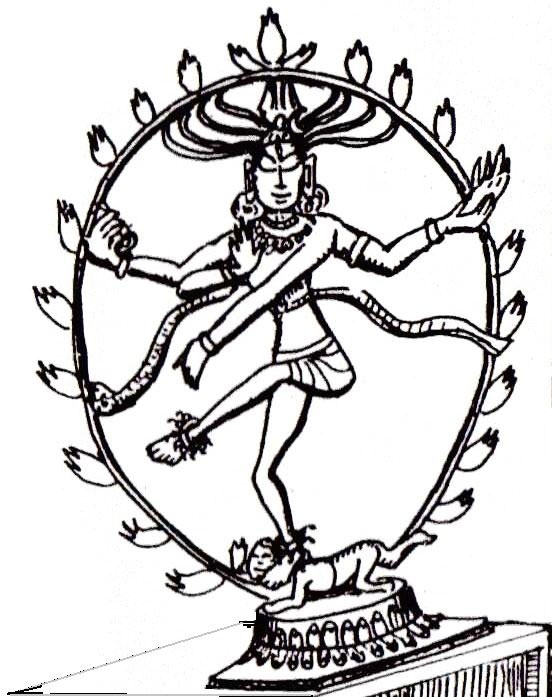 |
An elderly lady proudly brandished her pearl necklace and cast it into the box with a gesture of utter indifference to what she was losing. She was followed by a middle-aged lady who dropped into it a wad of folded American dollar notes. A bearded young man apologised for having forgotten to bring his purse but he unhesitatingly offered instead his new Swiss wristwatch.
Sensing that they were in the presence of a new saviour, the devotees gratefully formed themselves into a queue and one by one they piously walked towards the box with their varied offerings. Before long the box was filled to capacity with currency notes, jewellery, opal cufflinks and the like. After the ceremony of “practising selflessness” was over, Swami Sathya rounded off his sermon:
“O servants of God, you have all been spiritually cleansed through your unselfish offerings. You have cast aside your precious belongings by these acts of holy surrender to Him. Praise Him!”
Swami Sathya raised his arms, placed his thin palms together in a gesture of worship and with closed eyes, offered a few words of thanksgiving: “I thank Thee O God for bestowing on me this day the honour of being your humble spokesman.”
The disciples then departed to their homes feeling immensely satisfied and spiritually uplifted.
One day a famous and wealthy Hollywood film star, Sylvia Morgan, 26, turned up unexpectedly at the Sathya Centre. Though she had been thrice divorced and had been through several other trying crises in her private life, Sylvia still looked quite young, fresh and attractive.
Wiping a tear with her silk handkerchief, Sylvia complained: “I have a great many friends and admirers but I remain unloved. Nobody really loves me!”
“To be loved one should be lovable,” said the swami.
“How does one become lovable?” she asked anxiously.
“Only those who love others in a pure way, only those who love others without expecting any reward for it, only such persons become lovable.”
Sylvia gazed at the swami wistfully.
“Then please teach me how to begin loving in the way you have just indicated,” she begged. She added, “Where do I start?”
“Well, you can start by giving all your affection to your holy guru. As I happen to be your spiritual master can you do something to demonstrate the fact that your affection for me is selfless and therefore genuine?”
Immediately Sylvia reached for her handbag, fumbled for her cheque book and then wrote out a cheque in favour of the swami for $5,000. She prostrated herself on the floor, kissed his feet and meekly offered the cheque to him. Swami Sathya accepted the money without emotion, not uttering word of appreciation or thanks.
“I feel so marvellous, so fulfilled!” exclaimed Sylvia.
“Very well,” said the swami, “and now are you prepared to sacrifice your body as well to me because I am the embodiment of the spirit of God? Incidentally, through my clairvoyant powers I have just discovered that you were my wife in a previous life! So would you like to sacrifice your body by spending the night with me?”
Sylvia frowned at the swami with suspicion at first. A moment later she smiled and nodded her head, thereby expressing her willingness to comply.
In the deep silence of the night, when all the other residents of the spiritual centre were fast asleep, His Holiness tiptoed into Sylvia's bed and they gratified themselves sexually.
The next morning, Sylvia blurted out: “I feel wonderfully happy!”
“Ah, that's not surprising,” remarked the swami with a mischievous twinkle in his eyes, “for you have experienced divine bliss.”
Then in a fit of ecstasy Sylvia presented the swami with another cheque, but this time the amount had increased to $10,000. He accepted this second gift too, again without uttering a word of thanks.
From various sources, both at home and abroad, money kept pouring into the swami's coffers. His income was further augmented by the sale of books and cassettes of his inspired talks.
The swami's weeks of hectic activity passed swiftly and, as expected, Mr Trevor Casson, the General Manager of Latin American Travel Agents Limited, contacted Mr Ray Samuel alias His Holiness Swami Sathya by telephone.
“Venerable Sir,” said Mr Casson respectfully, “I've been reading a great deal about your religious work as reported in the newspapers. So I've been wondering whether you are still keen on cruising in the ODILIANA, which leaves for Rio de Janeiro next Monday. Are you, Sir? We can definitely offer you a fine cabin if you are still interested.”
“I am indeed! Tomorrow I'll wind up this blooming swami business. Thank god, now I have the money to buy myself not merely one large farm but several!”

click on the flowers to go up to the menu
|
|
Mysterious Stories of Sri Lanka Delhi: Sri Satguru Publication
|
|
Once a Friend Always a Friend Nandini Natesan and Jane Premadasa were the best of friends. Both these Sri Lankan girls were orphans. Nandini came from an orthodox Hindu family, and soon after her parents died in a motor accident she felt drawn towards Jane who was also parentless. Jane's mother had passed away soon after giving birth to her and at that time her father held the position of Assistant manager in a Colombo bank. This gentleman, an ardent Buddhist, being a lover of English literature, had named his daughter after his favourite novelist --- Jane Austen. His job had been so demanding that the poor man died of a heart attack when Jane was only ten years old. It is always a matter of sadness when children lose their parents so early in life but fortunately the two girls were well looked after by the wealthy relations of their respective families.
The slim and dark-complexioned Nandini and her chubby companion Jane were inseparable. Every morning they used to walk together to school through the dusty streets of Colombo holding each other's hands. They liked to sit together in class and share their textbooks. Nearly every evening they played table tennis and during weekends they loved to walk together along the famous marine drive of the city --- the Galle Face Green, munching curried peanuts or eating ice cream slowly, savouring every mouthful. Occasionally they would pool their pocket money and go to a matinee, for they had a great fondness for exciting Hollywood films. At such times they mingled with the crowd and behaved as though they were grown-ups.
One day Nandini and Jane were seated on a bench facing the sea and watching an enormous ship sailing down the palm fringed coast. Nandini softly held Jane's hand and blurted: “How nice if we were travelling in that ship to a distant fairyland where we could live happily ever after! It must be a place of magical beauty where only you and I live, with lots of sweets and lovely birds, and where we will never be troubled by school exams!” “Yes,” agreed Jane, “I'd love to live with you always and even our deaths someday should not separate us. Once a friend always a friend! We are friends for all eternity!”
The girls were intelligent and studious but it so happened that Nandini was bad in mathematics and science, while these were the very subjects in which Jane excelled. At a school exam the two girls were seated so close to each other that it enabled Jane to whisper the right answers to Nandini with the result that the latter passed the exam with flying colours. Nandini's unexpected success made her teachers suspicious. The stern and grey-haired headmaster summoned the two girls to his office and said: “We have found that both of you have written more or less the same answers. Now, be honest! Tell me exactly what happened. Nandini, didn't you copy from Jane?” “Of course I did,” said Nandini without any fear. “Why did you do that?” “Because,” replied Nandini, “Jane and I are really one student. We have separate bodies of course but we are one in heart.” Startled by this confession, the angry headmaster looked at Jane accusingly and said: “What have you to say Jane? Why did you help Nandini?” “Is it wrong to help your dearest friend?” replied Jane with a smile. The headmaster pondered for some minutes and said: “When students speak the truth I find it difficult to punish them. So you may go back to your class but try not to copy in future.”
After completing their secondary education at college the two of them blossomed into beautiful young women. They were frequently admired by young men when they went shopping. Their graceful deportment did not pass unnoticed. Elegantly dressed in their flowing silk saris, they strolled the bazaars like shapely mannequins.
The kind and caring relations of Nandini wanted to marry her to a highly qualified physician with a large practice in Edinburgh. When Nandini heard about the matrimonial proposal she declared: “I can't bear to be separated from Jane. She is my dearly beloved sister and lifelong friend. No one can possibly replace her in my life. We are one in spirit and we shall remain so until the end of time. Marriage is quite out of the question.”
Jane for her part tried to forestall any matrimonial proposals. So she posted letters to her older relations saying: “As I wish to lead a life of chastity and celibacy you are sincerely requested not to search for suitable marriage partners. I'm a very happy and fulfilled person. Even the presence of a thousand husbands cannot increase my present peace and happiness. Goodbye, dear astrologers and dear matchmakers. Try your luck elsewhere!”
Nandini and Jane were generally liked by all who associated with them. Yet they feared that malicious and envious persons might want to drive a wedge between them. Therefore every Sunday they started visiting a dilapidated old Christian church in Kotahena. They were drawn towards this place of worship despite the fact that Nandini and Jane had been raised in the Hindu and Buddhist faith respectively. After lighting candles before a statue of St Therese of Lisieux, the two girls would cross themselves and pray together:
|
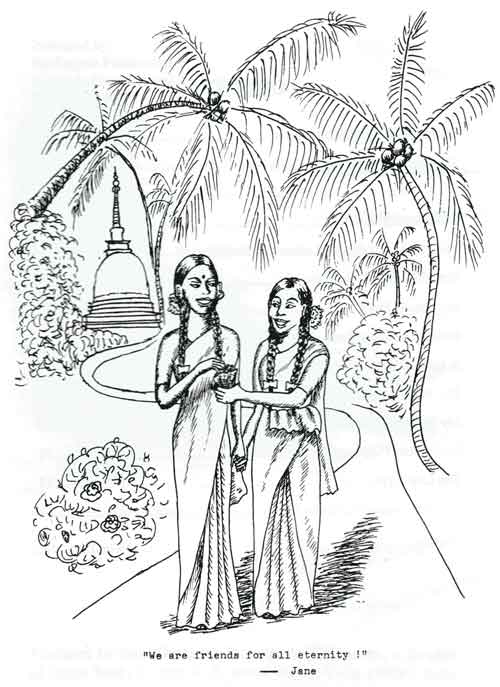 |
Together they travelled to India for their holidays. When they went on an excursion to Benares they chanced on a holy man who was practising austerities on the banks of the Ganges. “Come into my hut,” said the bearded ascetic in a friendly manner. They gladly accepted the invitation and sat on the floor right in front of him. They gazed at his luminous eyes and offered him some bananas and mangoes.
“I can see,” he remarked, holding a string of beads that is used for the repetition of sacred words, “that something is worrying you. Never be afraid. Fear is the most destructive emotion. It wears you out.”
“You are right,” said Nandini, giving him a flower, “because we are filled with fear and uncertainty about the future of our friendship. We are eager that nothing should mar it.”
“Friendship,” observed the holy man, “is even more valuable than the golden necklace you are wearing. Whereas gold is highly valued in the world there is really nothing more precious than the pure friendship that exists between persons who love one another. I bless the deep affection you have for each other. This special bond between yourselves originated in your previous lives and it will continue to thrive in your future lives also. Of that I am perfectly certain. I am making this prophecy.”
The three of them decided to walk along the banks of the sacred river with its many ancient temples, and ghats where corpses were being burnt. Monks in their orange coloured robes were bowing to the river and casting flowers into its moving waters.
“This river,” philosophized the holy man, “is very indifferent to what is cast into it, be it flowers or the ashes of the dead. Similarly, mustn't you also be indifferent to those who approve or disapprove of your friendship?”
As it was getting dark they respectfully touched the feet of the holy man and took leave of him. They returned to Colombo.
Every other day Nandini used to catch the suburban train from Colombo Fort station to Dehiwala where Jane lived. They loved to lunch together in Jane's flat and have a good gossip. One morning when Nandini was crossing a busy road near the Fort she was knocked down by a taxi that rushed past her. She lay unconscious on the road with blood stains on her sari. She was taken to a hospital but she never regained consciousness. Two days after the accident the doctors declared her dead.
The body of Nandini was cremated in the presence of a large gathering of her friends and relations with full Hindu religious rites. A week after the funeral her ashes were immersed in the sea near Mount Lavinia.
Needless to say, poor Jane was heartbroken over the death of her beloved. She wept a great deal, because Nandini was more than a mere friend: she had been, in fact, part and parcel of her very soul. Her demise shook her to the foundations of her being. Whenever she met her relations she would say: “I feel like taking my own life. What's the point of living in a world without Nandini?”
She ate very little and looked rather thin. There were dark rings around her eyes.
One morning, exactly two weeks after the funeral, Jane heard the doorbell ring. Thereupon she unlocked her sitting room door and opened it. She next peeped through the curtains nervously. Right in front of her was a slim figure with a most familiar face. It was Nandini!
Dressed in her favourite blue sari, Nandini looked exactly as she did when they were last together. Jane immediately walked up to Nandini and embraced her. Nandini laughed brightly and said: “I'm paying you a brief visit. I've come to tell you that I'm extremely happy where I am. It's sheer bliss. Please don't worry about me.”
“Won't you come in and have a cup of tea?” said Jane.
They sat together in the kitchen as they used to do in times past. They chatted for twenty minutes.
Nandini accepted the tea and drank it. Noticing that her cup was empty, Jane said: “Won't you have another cup of tea?”
“It is kind of you, my dearest,” remarked Nandini, “but it's time for me to leave.”
She left the flat with a sweet smile on her face.
click on the flowers to go up to the menu
|
|
The Author
A total stranger spoke with me on the street. It was just outside the British Library in London.
“You work there, don’t you,” he said with a knowing smile.
“Yes,” I answered.
“So do I,” he said quickly, assuring me, as it were, that both of us have something in common. That Friday evening I felt the need to unwind after an exceptionally busy week. So I did not mind getting into a conversation with this slightly built man with foxy facial features. I particularly liked that he was friendly and easy to talk to in a society wherein the vast majority are rather reserved. Dressed elegantly in a grey three-piece suit and a fine silk tie, he spoke with a northern accent. Good-looking with blonde hair, this well-mannered man also gave the impression of being very prosperous.
“I’ve been slaving away all afternoon preparing my acceptance speech,” he remarked casually.
“Acceptance speech ? Acceptance of what ?” I asked, out of curiosity.
“Nobel prize,” he replied nonchalantly, shrugging his slim shoulders and looking at the rush-hour traffic on Euston Road.
|
My mind raced as I tried to work him out. During the next few minutes it occurred to me that the gentleman was quite out of the ordinary. I realised that although I had read numerous articles about Nobel laureates, I had never had the pleasure of either seeing or meeting any laureate in the flesh. What a privilege even to chat away with a laureate for some minutes as though we were old friends ! “What’s your name, Sir ?” “My name is not important --- only my writings are …” he quipped. “What are the titles of your major books ?” “It’s not in my nature to brag about my achievements,” he said tersely. He impressed me as being a rather self-effacing man of letters. “If you’re in need of anything, tell me,” I said, trying hard to be of some help.
“Hunger pangs,” he complained, pointing to his stomach. “May I invite you for a vegetarian meal ?” “Yes, you may. I’ll do you that honour,” he said.
Clearing a way through crowds of shoppers, I managed to guide the distinguished author to my favourite restaurant near Fitzroy Square. There I offered him a plate of fried rice and vegetable curry. At the end of the meal he said that he was still feeling very hungry. Next I offered him a few samosas which he devoured in a few bites. “I haven’t had a square meal for three days,” he said. I felt sorry for him.
I had nothing but praise for the great writer, saying, “What an accomplishment ! Winning the Nobel prize !” “I wouldn’t know what to do with all that prize money,” he remarked pensively. “A lot of wealth ?” “I suppose,” he said, “but I don’t know the exact amount. The author, you see, has a certain lack of interest in money. After receiving it I might give it all away in charity. Perhaps I’d refuse it in the manner of the Russian poet and novelist Boris Pasternak.” “Sir,” I declared, “you’re a man of noble character.” “Just so, but I need the odd pound every now and then to meet my daily expenses.” “Exactly !” I exclaimed, nodding my head in agreement. “The author’s mind,” he continued, “operates at a lofty level. My insights are so profound that I’m often absent-minded. Today, for instance, I forgot to take my purse with me.” “Wait a minute, Sir,” I interrupted the man of letters, and then proceeded to make a gift of £50 as a token of our friendship. He readily accepted it.
As we were trundling along to the railway station he expressed a wish to remain silent. “The author needs quietness,” he stated, “the poor fellow requires some peace to think, so let’s be quiet, if you don’t mind.” So, out of deference to him, I stopped talking. It was just as well that we interrupted our conversation as the traffic noise was deafening.
Soon we reached King’s Cross station where, breaking the vow of silence, he told me that he much admired the massive cathedral-like red structure. Then we started going towards the crowded platform. Soon the last train to Leeds would be leaving. Just before boarding the train, he shook my hand. He was standing right in front of me. All of a sudden he cold not look me in the face. “Thanks for everything,” he said, without showing much emotion. He added, “please understand that I never said that I’d won the Nobel prize, did I ? I only indicated that I might win it someday.” Immediately he jumped into the train --- never to be seen again. |
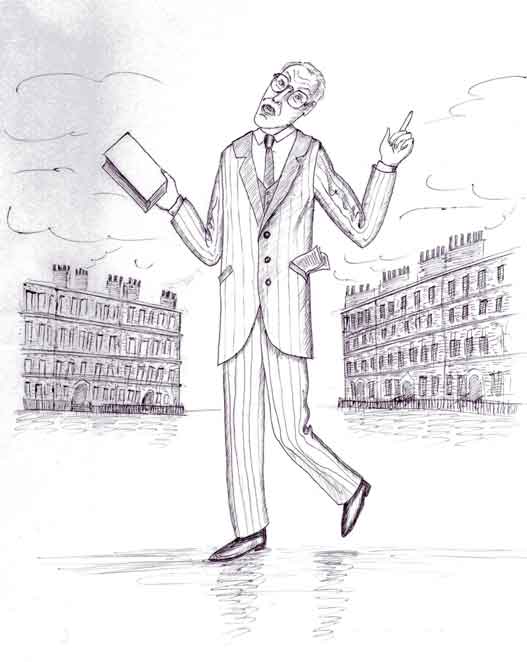 |
click on the flowers to
go up to the menu
|
|
A one-act play of 12 scenes
Its approximate duration is 60 minutes
|
Countess Charlotte de la Rochelle is an extremely wealthy French aristocrat who lives in the south of France. She is the main character. There are altogether 9 characters, including the Countess. Countess Charlotte turns forty four. She realises that time has rushed past her far too quickly. On her 44th birthday she says “Today I feel like a stranded passenger who has failed to catch the train of happiness! My villa is like a deserted platform! Oh, I've missed the greatest pleasures of life!” She is very depressed and unhappy. Her Private Secretary Jean-Claude tries to console her by saying “Don't you own three splendid chateaux in the Loire Valley with hundreds of acres of parkland around them?” “Gosh,” exclaims the Countess, “I'm not terribly interested in having three grand chateaux, I'd rather be the mother of three children! Of what value are masses of bricks and mortar? Such possessions are useless to a childless woman who yearns for children of her own. Time is running out!” That is how the play begins. Much of the play is devoted to her conversations with prospective husbands. She tries very hard to find a suitable husband but she finds that all her prospective husbands fall short of her expectations. For different reasons she has to turn down all of them. She is bitter and disillusioned. She fails to meet the man of her dreams. Her suitors are attracted only to her wealth and never to her personally, despite the fact that she is quite a beautiful woman. Although the American Senator Perkins notices that Countess Charlotte is physically attractive, his egalitarianism is such that it urges him to tell her that he is never “impressed by bloody titles”. The Senator remarks that he has always sought three things in life --- wealth, power and glory. When they discuss the question of marital fidelity, the playboy Senator states that running after skirts has become second nature to him now. He also tells her that he wants to marry someone who is rich enough to finance all his election campaigns. The Senator can only offer her his companionship. A thrice married man who has fathered 7 children, he does not want to have any more kids. The unlucky Countess is very disappointed. Countess Charlotte flies to Calcutta to meet another prospective husband. Mr Gupta is not only extremely poor but is also an unemployed typist with no qualifications whatsoever. The man confesses that he is “magnetically drawn” to her wealth. He tells her frankly that her money is the sole reason why he is keen on marrying her immediately. He believes that wise men marry first and fall in love later. So he assures her that love will grow slowly with the passage of time. She is disappointed that there is neither romance nor affection. At Heathrow Airport in London Countess Charlotte has an appointment with Tom. He had already written her a couple of letters wherein Tom had indicated that he is particularly interested in reproduction. Tom had also sought her friendship and even requested her photo. When they meet for the first time their conversation is animated. They realise that they have got a lot in common. Next they discuss reproduction. Great is her disappointment when the Countess finds that there has been a terrible misunderstanding on her part. Tom's field of interest is not human reproduction but documentary reproduction! For Tom's business is that of a shopkeeper who sells photocopying machines. There is a hilarious exchange. The Countess asks Tom whether he has a desire to produce children. Tom replies: “Produce children? As I happen to be a man, I can't produce a baby even if I try! Ha! Ha!” He tells the Countess that he does not need her.
|
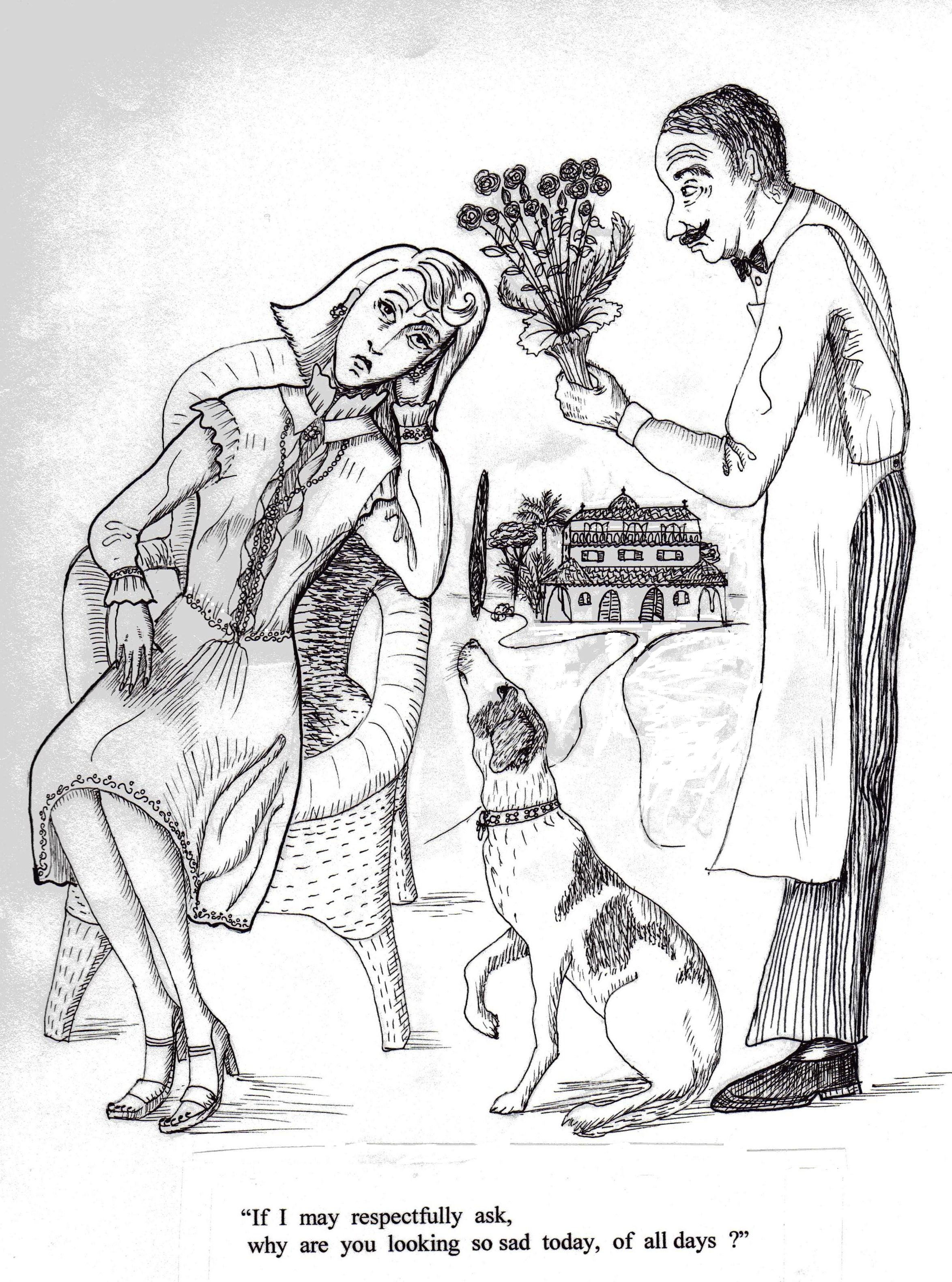 |
In the next
scene Countess Charlotte finds herself seated near an art dealer in a
plane. The man praises the Countess by telling her that she has the
rare combination of beauty and sex appeal. In the course of their
conversation Countess Charlotte remarks that whereas she is eager to
reciprocate his gesture of friendship, she feels that she cannot do so
as he is still a stranger. The art dealer states that he is a confirmed
bachelor who has had numerous one-night stands. The Countess starts
talking about love. He then remarks that only saints have attained the
supreme state of selfless love. The Countess declares that a man must
first of all show her some affection. She insists that the friendship
that she is offering has a high price to be paid. The art dealer
retorts: “High price to be paid? Madam, what exactly is the price? I'll
pay any price for a brief fling.” The countess is propositioned. She
proudly makes it clear that she is not a tart.
She retires for a time in a Greek island. There she is given to much contemplation. She makes a big decision and then returns to her villa in France.
All her servants and staff members gather to welcome her back home. All of them are given generous pensions. Her castles are given away in charity. She parts with most of her possessions. She decides to move into a little cottage of hers for the rest of her days. She next tells all her staff members: “After making all these donations I'll still have enough to maintain a reasonable standard of living. I'll move into my modest little holiday cottage in Antibes overlooking the bright blue waters of my beloved Mediterranean. How marvellous! Those vast blue expanses of water! Those blue skies and coloured sunsets! The tall cypresses in my garden are my sons and the dark green pines and olives are my daughters. I don't need any other family, do I?” Then the surprised Jean-Claude asks: “Countess Charlotte, in the end will you be happy?”
Countess Charlotte: “I'm no longer simmering with resentment towards men who've treated me like dirt. I'm no longer envious of women who are happily married. Nor am I jealous of women who are blessed with loving children. I feel at peace with the world. I also feel at peace with myself. Now that I'm a hermit who isn't immersed in worldly pursuits, I find that my heart is pure and compassionate.”
Jean-Claude: “But are you really happy?”
Countess Charlotte: “To say that I'm happy is an understatement. The truth of the matter is that I'm blissfully happy.”
That is how the play ends. There is a message. Real happiness or lasting happiness cannot be found by means of vast wealth. By becoming a hermit Countess Charlotte discovers inner peace and joy.
click on the flowers to go up to the menu


